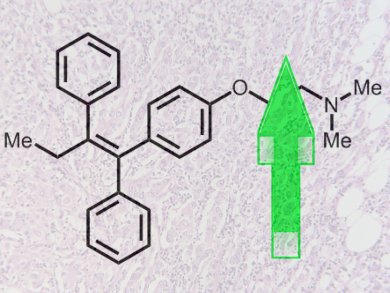Autophagy is the cell’s method for handling cellular waste and releasing building blocks for recycling. Many cancer cells show increased autophagy. The increased release of building blocks equip the cancer cells with a growth advantage and can render them resistant towards treatment.
Anders Lund and co-workers, University of Copenhagen, Denmark, discovered a small molecule, microRNA-101 (miR-101), that can block autophagy in breast cancer cells. Through transcriptome profiling, the team identified three novel microRNA-101 targets, STMN1, RAB5A, and ATG4D. The role and importance of these targets in autophagy regulation was confirmed by siRNA-mediated depletion of these genes, which phenocopied the effect of microRNA-101 overexpression.
Additionally, microRNA-101 was shown to increase the sensitivity of breast cancer cells towards tamoxifen (pictured). This is one of the most commonly used treatments for breast cancer and resistance is a large problem.
- microRNA-101 is a potent inhibitor of autophagy
L. B. Frankel, J. Wen, M. Lees, M. Høyer-Hansen, T. Farkas, A. Krogh, M. Jäättelä, A. H. Lund,
EMBO J. 2011.
DOI: 10.1038/emboj.2011.331




